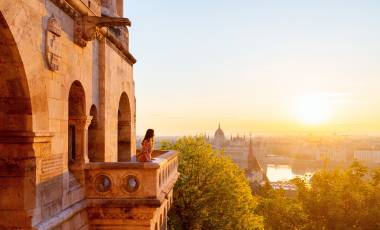
What “Helping You Impress” means in action
On the restorative power of travel

The siren call of travel lures millions of people every year to book that ticket across the world, pull from their savings, eat cold leftovers for months to afford that dream trip—and it isn’t really any surprise why. Travel is transformative. It is the closest real-life experience we have to the fantasy worlds of The Lord of the Rings or Harry Potter—it puts us in cities and scenes so foreign to our daily life that we can hardly believe we find ourselves where we are. It’s no surprise, then, that the research backs travel as a way to improve cognition, physical fortitude, and connection with the world and humankind. Here’s a bit more on how.
(Feel free to share this blog and its contents with your audience! We’ve created brand-neutral social media assets you can download here, making it easy for you to present the content as your own.)
Science points to this: travel is good for the mind. From the moment one starts planning that next adventure, to the thrill of experiencing it, to the lingering aftereffects of the journey upon return home, travel is a boon to the brain. A 2014 study from Cornell University showed that the anticipation of experiential purchases—like a trip—versus material purchases led to higher overall happiness. Not only was the lead-up to travel more joyful, but the happiness it brought lasted longer than the kind sparked by buying material goods.
One of the primary reasons travel benefits mental well-being is that it takes us out of our comfort zones—from the food we eat, to the language we hear, to the new streets we navigate. It’s an inspiration and a stressor—a good kind of stress. This mild, positive stress has been linked to improved cognitive function. Northwestern University’s studies on “superagers”—people in their 80s or older with the mental sharpness of those decades younger—highlight individuals like June Scott, a 92-year-old who has visited over 100 countries. This NPR article discusses how curiosity, social engagement, and frequent learning (all hallmarks of travel) may play a role in keeping the brain young.
Back home, we often move through life on autopilot. But while traveling, our minds light up with new information; we problem-solve constantly—decoding signs, figuring out transportation, adjusting to cultural nuances. It’s a mental workout that strengthens our cognitive muscles and may even help us age more gracefully.
Travel doesn’t just challenge the mind—it activates the body. Whether strolling through winding alleys in Venice, hiking the hills of the Scottish Highlands, or dancing at a neighborhood festival in Seville, travel naturally nudges us into movement. Unlike the rigidity of a gym routine, this is movement that feels joyful and organic. According to the Centers for Disease Control and Prevention (CDC), even moderate physical activity—like walking—can improve heart health, reduce the risk of chronic diseases, and promote better sleep. Travel encourages this kind of activity without our even realizing it, often pushing us to walk farther, climb more stairs, and spend more time outdoors simply through the joy of exploring a new destination.
There’s also a powerful immune-boosting effect that comes with moderate exposure to new environments. Some research suggests that exposure to a broader variety of microbes (especially in nature and in rural areas) can diversify and strengthen the microbiome, which supports immune function. Plus, when we’re away from our desks, daily stressors, and the fluorescent lights of our routines, we tend to breathe a little deeper, sleep a little sounder, and feel a little more connected to our physical selves. And that alone has measurable effects on lowering cortisol (stress hormone) levels and boosting overall health.
If travel is good for the body and mind, it might be even better for the soul. There’s something magical about waking up in a new place, where the air smells different, the coffee tastes new, and every sound around you are unfamiliar. This is where transformation happens. Travel reconnects us with wonder—something we often lose in the regular routine of our adult lives. That sense of awe we feel standing beneath the Northern Lights or witnessing the quiet reverence of a centuries-old temple? That’s what brings us back to booking our next adventure.
It also reminds us of our smallness in a vast world and, paradoxically, our place in it. Meeting people from different cultures and hearing stories entirely unlike and like our own expands our empathy and perspective. It breaks down assumptions, builds bridges, and leaves us with a deeper understanding of what connects us all. A well-timed journey can become a personal pilgrimage—offering reflection, renewal, and a sense of meaning that can inspire us long after we’ve unpacked our suitcase.
So, while travel may take a bit of planning, budgeting, and bravery, it gives back tenfold in return to the overall health of our minds, bodies, and souls. Whether it’s a weekend road trip or an adventure across continents, stepping away from the familiar has profound benefits. In a world that often moves too fast, forces us to be constantly connected to our phones or computers instead of our fellow humans, travel invites us to slow down, to pay attention, and to come home—not just to our houses, but to ourselves.